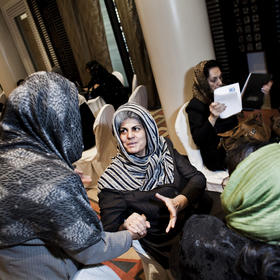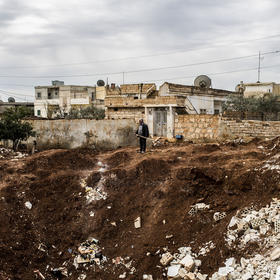Anecdotes from the field suggest that religious women have found some success negotiating with violent groups in conflict zones around the world. Through negotiation and mediation, these women seem to play a role in local agreements and fragile peace deals achieved through formal processes. Their moral calling and the trusted role that religious women play in their community may be part of what makes their work effective.

These women’s successes can inform peace practices elsewhere. USIP’s religion and peacebuilding team is working with local researchers, in partnership with the International Center for Religion and Diplomacy and the Network of Religious and Traditional Peacemakers, to document and analyze cases of religious women negotiating on the front lines. In this project we seek to:
- Develop a curriculum and peer-to-peer training methodology informed by evidence-based research which will identify which arguments have been most effective in engaging with armed groups to build peace.
- Support women who engage in peacebuilding with armed groups through piloting curriculum and training methodology,
- Inform the international and donor communities on ways to develop inclusive peace processes and programming that are more contextually relevant and effective by understanding women’s successful techniques.
There are three phases to this project that will allow us to accomplish the goals of developing a curriculum, supporting women negotiators and informing the international community. We are seeking funding and partners for phases two and three, as we have completed phase one of our research as of July 2021.
Phase 1 – Documentation of Case Studies
We have documented case studies from around the world to identify effective tactics and strategies that religious women employ in negotiating with armed groups. These studies will be featured on USIP’s website and will also be collected into a larger book covering the topic of religious women negotiating. The cases we have examined cover Afghanistan, Libya, Syria, Myanmar, Nigeria, Kenya, the Philippines, Northern Ireland, Yemen and Colombia.
Several initial findings from this research include:
- Religious institutions, language and symbols seem to open doors before actual negotiations begin.
- The access and legitimacy these women have within their communities enable them to work in areas others cannot.
- These women participate in mediation, facilitation and negotiation activities and do not clearly differentiate between techniques, using them interchangeably.
Phase 2 – Development of Curriculum
In this phase, we seek to develop a curriculum based on case studies, research and findings. This curriculum will be based on the lessons learned in the case studies, especially regarding religious women’s direct engagement, their specific strategies (including the type of language they use), the resources they draw on and perceptions of their credibility and moral authority.
Phase 3 - Capacity Building
We seek to train women who are involved in negotiations at local and national levels to apply the curriculum and peer-to-peer training methodology. With the support of partners, we will transform the curriculum into a pilot training-of-trainers so that it can be implemented as peer-to-peer learning. This phase aims to enhance mentorship and communication strategies through connecting women to local and national leaders, media outlets and each other so that they may more effectively contribute to inclusive and sustainable peacebuilding.







